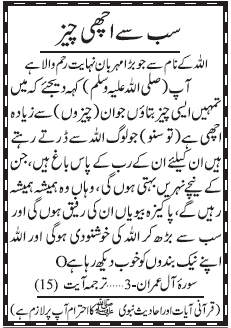Hazrat Abdul Wahid ibn Zayed (ra)
Hazrat Khwaja Abdul Wahid ibn Zayd (rh)
Hazrat Imam al-Hassan Basri r.a had numerous followers drawn from diverse backgrounds; the literature of the time describes some of them as being scholars and others who were holy warrirors. They were united by their sanctity and asceticism, as well as by their harmonization of the inner precepts and outer practice of Islam. They despised social injustice, luxury and hypocrisy-the contradiction between inner and outer jihad, thoughts and deeds. One of these holy warriors, Abd al-Wahid bin Zayd r.a became Hazrat Hassan al-Basri's khalifa.
He was a student of Imam Abu Hanifa r.a in fiqh, and was taught hadith and tafsir by his murshid as well as taking from him the path of tasawwuf. He used to fast the entire year round, except for the two festivals of Eid.These fasts sometimes used to last for up to three days, after which he would breaking his fast with few morsels of food. His nights were awake in Ibadah. It is said that he passed forty years in such Mujahidahs before becoming the murid of Khwaja Hassan al-Basri r.a.
Although Khwaja Abd al-Wahid r.a was one of the great early Sufis, he remains far less famous than the other major figure of Sufism in this era. This might be because he spent most of his time not in the cities and major centers, but in the wilderness of the frontier regions. His travels took him as far as China. Indeed, he has achieved fame as the founder of the first Sufi Khanqah, on the island of Abbadan. This was a former military outpost that he converted into a training station for the mystics of Iraq. Addadan became a major attraction for those wishing to become mujahidin. The post was manned by ghazis who combined military service with religious worship in the form of dhikr. They practiced the constant recitation of Allah, whether in battle or peace-time, movement or rest. In this , Imam Abd al-Wahid pre-empted the Sufi military orders of Futuwwah-themselves the inspiration for medieval ideals of chivalry and nobility in warfare-by several hundred years.
In his lectures, Hazrat Abd al-Wahid r.a provided vivid images of the Day of Judgment to his followers; he used to admonish them to prepare for the meeting with their creator. He also informed his disciples that Allah bestows secret knowledge on His righteous friends.
Like many of the early Sufis, He admired monks and holy men of other religions for their disdain of the world and the sincerity of their search for Allah; though they differed with them in matters of faith. This was a common understanding of the time, as borne out by the following hadith of Abu Bakr as-Sadiq r.a (as he explained the rules of Jihad to his armies) "and you may come across monks and holy men searching for Allah. Let them alone and do not destroy their sanctuaries".
Once, upon his travels, Khwaja Abd al-Wahid arrived at a monastery in China. When he greeted the monk, though, the latter did not reply until he had called repeatedly. The monk than said, "I am not a monk (rahib). A monk is one who fears Allah who is in the heavens. He honors Allah's greatness; he is patient in the face of the calamities He sends, and he is contented with His decree. He praises Him for his forgiveness;he is thankful for his bounties, and he is humble in the presence of His glory. He accepts His power; he fasts during the day; and he performs salah during the night, when the mention of Hell keeps him awake. I, however, am not such a raahib-I am but a wild dog that preys on others. I have imprisoned myself here for fear of devouring other people with my tongue." Khwaja asked, " Oh Monk! What has misled people from their Lord?" He replied," Oh Brother ! After recognizing Allah, it is the love of this world that has led people astray. Love of the world is the root of transgression. An intelligent person is one who expels this love from his heart, repent for his sins and focuses on that which brings him the nearness of Allah."
Towards the end of his life, Khwaja Abd al-Wahid became severely paralyzed, such that he was unable to make wuduh. Once finding no-one present to help him, he became extremely restless and makes Duaa to Allah to assist him. Immediately he was cured from his illness. He made his wudhu and performed his salah calmly, only when he had finished did his paralysis return.
Hazrat Khwaja Imam Abd al-wahid bin Zayd attained unity in Basra in 170 AH, although some scholars say the year was 177 AH. He left behind three major Khulfa, among whom the most senior was Hazrat Khwaja Fuzail bin Ayaz R.a.





 This is a free homepage created with page4. Get your own on www.page4.com
This is a free homepage created with page4. Get your own on www.page4.com